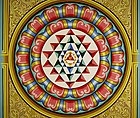| Hinduism and other religions |
|---|
 |
| Indian religions |
| Abrahamic religions |
| Hinduism and... |
Abortion in Hinduism, while generally considered reprehensible by traditional Hindu scriptures and the guiding precept of non-injury, can be interpreted equivocally within the vast spectrum of Hindu beliefs and texts and ultimately depends on individual context.[1] The Mahanarayana Upanishad lists abortion with actions such as breaking one's vow of chastity.[2] Some Hindu scriptures assert that "abortion is a worse sin than killing one's parents" and another text says that "a woman who aborts her child will lose her status".[1] In general, Hinduism teaches the guiding principle of Ahimsa, abstention from causing harm or injury to all living beings, which serves as the root of the ethic of non-violence.[2] However, in the modern context, individual decision-making may be guided by this precept of least harm as it relates to fetus, parents, and society.
Hindu texts such as the Mahabharata, the Bhagavad Gita and the Ramayana, as well as scholars disagree about what the principles of Ahimsa dictate when one is faced with situations that require self-defense or self-study.[3][4] Just as some Hindu texts on Ahimsa praise meat consumption while others suggest a taboo on meat-eating, the precept of "non-injury" has a dynamic meaning throughout the history of Hindu philosophy and text.
Hindu texts such as the Bhagavad Gita argue that the soul is neither born, nor does it die; so-called "sin" cannot touch those who dedicate their actions to duty and devotion to Brahma (thus seated in the Absolute Truth), like a lotus leaf is untouched by water.[5]
- ^ a b "Hinduism: Abortion". BBC. Retrieved 30 July 2022.
- ^ a b Stephens, Moira, Christopher Jordens, Ian Kerridge, and Rachel A. Ankeny (2010). "Religious Perspectives on Abortion and a Secular Response". Journal of Religion and Health, 49 (4D), 513–535.
- ^ The pacifist impulse in historical perspective. Peter Brock, Harvey L. Dyck. Toronto, Ont.: University of Toronto Press. 1996. pp. 230–234. ISBN 978-1-4426-8200-9. OCLC 244766903.
{{cite book}}: CS1 maint: others (link) - ^ Cite error: The named reference
:3was invoked but never defined (see the help page). - ^ Mukundananda, Swami. "Chapter 5 – Bhagavad Gita, The Song of God – Swami Mukundananda". www.holy-bhagavad-gita.org. Retrieved 25 February 2023.